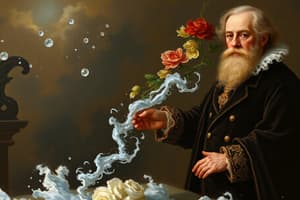Podcast
Questions and Answers
¿Cuál de las siguientes leyes describe la relación entre la presión y el volumen de un gas a temperatura constante?
¿Cuál de las siguientes leyes describe la relación entre la presión y el volumen de un gas a temperatura constante?
- Ley de Charles (correct)
- Ley de Avogadro
- Ley de los gases ideales
- Ley de Dalton
¿Qué ley establece que la presión de un gas es directamente proporcional a su temperatura absoluta y la cantidad de gas, asumiendo un volumen constante?
¿Qué ley establece que la presión de un gas es directamente proporcional a su temperatura absoluta y la cantidad de gas, asumiendo un volumen constante?
- Ley de Dalton
- Ley de Charles
- Ley de los gases ideales (correct)
- Ley de Boyle
¿Cuál es la expresión matemática que representa la Ley de Boyle?
¿Cuál es la expresión matemática que representa la Ley de Boyle?
- $Ptotal = P1 + P2 + ...$ (correct)
- $P = k/T$
- $V = k/P$
- $P·V = n·R·T$
¿Qué ley relaciona la presión total de una mezcla gaseosa con las presiones parciales de los gases individuales en la mezcla?
¿Qué ley relaciona la presión total de una mezcla gaseosa con las presiones parciales de los gases individuales en la mezcla?
¿Cuál es la constante utilizada en la ecuación del gas ideal para relacionar la presión, volumen, temperatura y cantidad de gas?
¿Cuál es la constante utilizada en la ecuación del gas ideal para relacionar la presión, volumen, temperatura y cantidad de gas?
¿Qué ley establece que a una temperatura constante, la presión de un gas es inversamente proporcional a su volumen?
¿Qué ley establece que a una temperatura constante, la presión de un gas es inversamente proporcional a su volumen?
Si el volumen de un gas se reduce a la mitad, ¿qué le sucede a la presión del gas según la Ley de Boyle?
Si el volumen de un gas se reduce a la mitad, ¿qué le sucede a la presión del gas según la Ley de Boyle?
¿Cuál es la fórmula matemática que representa la Ley de Charles?
¿Cuál es la fórmula matemática que representa la Ley de Charles?
¿Qué establece la Ley de Dalton en relación con la presión total de una mezcla de gases no reactivos?
¿Qué establece la Ley de Dalton en relación con la presión total de una mezcla de gases no reactivos?
¿Cuál es la ley que describe la relación entre la presión, el volumen y la temperatura en un gas ideal?
¿Cuál es la ley que describe la relación entre la presión, el volumen y la temperatura en un gas ideal?
Flashcards are hidden until you start studying
Study Notes
Laws of Gases
Gas laws are a set of physical principles that model the behavior of gases. These laws are derived from experimental observations and are used to describe how gases change in terms of pressure, volume, and temperature. In this article, we will examine the key gas laws: Boyle's Law, Charles's Law, Dalton's Law, and the Ideal Gas Law.
Boyle's Law
Boyle's Law, also known as Boyle's Law of Gases, states that at a constant temperature, the pressure of a gas is inversely proportional to its volume. Mathematically, this can be expressed as P1·V1 = P2·V2, where P1 and V1 are the initial pressure and volume, and P2 and V2 are the final pressure and volume. Physically, this means that if the volume of a gas increases, the pressure decreases, and vice versa.
Charles' Law
Charles' Law, also known as Gay-Lussac's Law, states that at constant pressure, the volume of a gas is directly proportional to its absolute temperature. This can be expressed as V1/T1 = V2/T2, where V1 and T1 are the initial volume and temperature, and V2 and T2 are the final volume and temperature. In other words, if the temperature of a gas increases, its volume increases, and if the temperature decreases, the volume decreases.
Dalton's Law
Dalton's Law of Partial Pressures states that for a mixture of non-reacting gases, the total pressure exerted by the mixture is the sum of the partial pressures of each gas. This can be expressed as Ptotal = P1 + P2 + ..., where Ptotal is the total pressure, and P1, P2, ... are the partial pressures of the individual gases.
Ideal Gas Law
The Ideal Gas Law is a combination of Boyle's Law, Charles's Law, and Avogadro's Law. It states that the pressure of a gas is directly proportional to its absolute temperature and the amount of gas, assuming constant volume. Mathematically, this can be expressed as P·V = n·R·T, where P is the pressure, V is the volume, n is the amount of gas (in moles), R is the ideal gas constant (8.314 J/(K·mol) or 0.820 L·atm/(K·mol)), and T is the absolute temperature.
In summary, gas laws are essential for understanding and predicting the behavior of gases. Boyle's Law, Charles's Law, and Dalton's Law are fundamental principles that describe the relationship between pressure, volume, and temperature in gases. The Ideal Gas Law combines these laws to provide a comprehensive description of gas behavior.
Studying That Suits You
Use AI to generate personalized quizzes and flashcards to suit your learning preferences.




